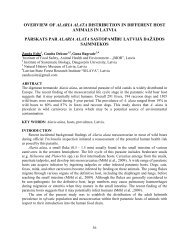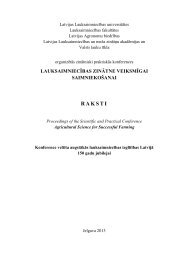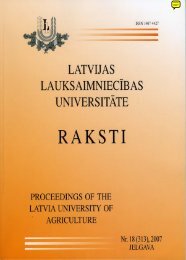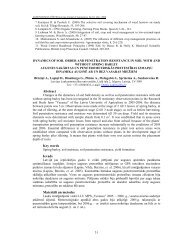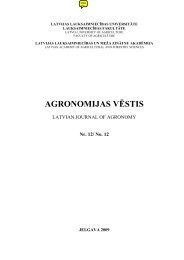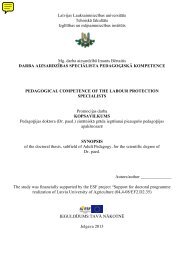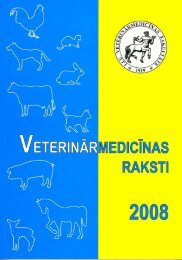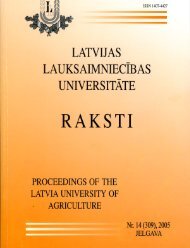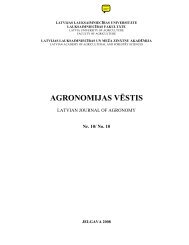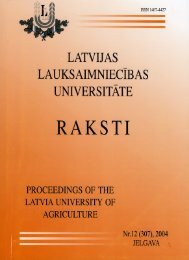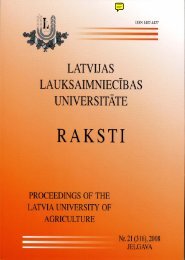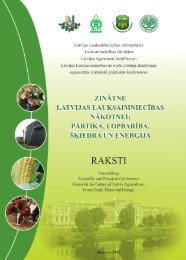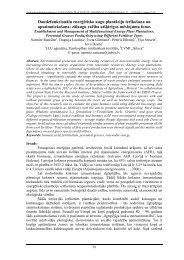Latvia University of Agriculture - Latvijas Lauksaimniecības ...
Latvia University of Agriculture - Latvijas Lauksaimniecības ...
Latvia University of Agriculture - Latvijas Lauksaimniecības ...
You also want an ePaper? Increase the reach of your titles
YUMPU automatically turns print PDFs into web optimized ePapers that Google loves.
I. Katane Ecology <strong>of</strong> Education as a New Interdisciplinary Research TrendEcology <strong>of</strong> Education as a New Interdisciplinary Research TrendI. KataneInstitute <strong>of</strong> Education and Home Economics, Faculty <strong>of</strong> EngineeringThe semantics <strong>of</strong> the concept ecology for many scientists is still related merely tothe research in the field <strong>of</strong> natural sciences, first <strong>of</strong> all, in the field <strong>of</strong> animal and/orplant ecology as well as to the solution <strong>of</strong> nature protection and sustainability problemsnowadays. It has its substantiation, since the term ecology in the scientific terminologywas introduced by a German zoologist E. Haeckel who was also the founder <strong>of</strong> the newinterdisciplinary research trend bioecology. Thanks to the research performed by anAmerican scientist Ellen S. Richards and her colleagues, at the end <strong>of</strong> the 19 th century theUSA became the grounds for the new interdisciplinary research trend — human ecology,which, alongside with bioecology, develops nowadays as an independent trend <strong>of</strong> ecology.During the 20 th century there emerged and developed new scientific conceptions andtheories, representing different sub-trends <strong>of</strong> human ecology, because the ecologicalparadigm became an transdisciplinary scientific paradigm. The new trends <strong>of</strong> humanecology began to develop on the basis <strong>of</strong> particular sciences, focusing the scientists’attention towards one or several environmental contexts. In human ecology we candistinguish psychological ecology/ecology <strong>of</strong> psychology, economic ecology, politecology/ecological politology, social ecology, cultural ecology, art ecology, family ecology,anthropological ecology, deep ecology/ecosophy as environmental ethics etc. Humanecology is the universal scientific trend, which provides new — ecological perspectives —for the innovative, up to now unconventional research in different scientific disciplines.The philosophical-methodological basis <strong>of</strong> the various trends <strong>of</strong> modern humanecology became also the grounds for the development <strong>of</strong> ecology <strong>of</strong> education as aninterdisciplinary trend <strong>of</strong> human ecology. Ecology <strong>of</strong> Education is one <strong>of</strong> the trends <strong>of</strong>human ecology; the interdiscipline integrating natural, social sciences, and the humanities,which studies the interaction between a human being as individual and/or social systemsand the multidimensional environment from the holistic perspective, viewing educationas the facilitator <strong>of</strong> the sphere, process, result, and development <strong>of</strong> human activity inthe aspect <strong>of</strong> human and environmental quality/trait. Due to the variety <strong>of</strong> the trends <strong>of</strong>human ecology, the varied explanations and interpretation <strong>of</strong> the concept environment arealso transferred to educational ecology: 1) environment — it is us (social environment);2) environment is everything that surrounds us and is outside us; 3) environment — thetotality <strong>of</strong> the reflections <strong>of</strong> real things, phenomena, processes in the human psyche; 4)environment is a multilevel ecological system (ecosystem), within which a human beingis as an endosystem, sub-structure <strong>of</strong> ecosystem; 5) environment is a multi-componentand multi-functional system <strong>of</strong> interaction, where a human being is an integral part <strong>of</strong>environment; 6) environment as an interaction process; 7) environment as the sphere<strong>of</strong> human activities; 8) environment as the field <strong>of</strong> semantics; 9) environment as aresource; 10) environment as a means for social stratification.Educational ecology possesses the significant potential for interdisciplinary researchand several developmental perspectives, as a result <strong>of</strong> which through research it ispossible to solve several modern topical problems: 1) promotion <strong>of</strong> human development,self-realisation in the educational environment; 2) studies and development <strong>of</strong> differenthuman qualities and their totality (viability; competitiveness; competences; creativity;thinking, mental and emotional flexibility; attitudes etc.) in the educational environment;3) education for: human socialisation and culturalisation; the successful human adaptation,integration and development in the changeable and multi-functional environment: social,cultural, different pr<strong>of</strong>essions etc. environment; the development and improvement <strong>of</strong>home environment; 4) education for the development <strong>of</strong> human basic competenciesfor living on changeable conditions, in the rapidly changing human-built, includingenvironment <strong>of</strong> information and latest technologies; 5) ensuring <strong>of</strong> lifelong learningin the varied educational environment for the development <strong>of</strong> knowledge society; 6)sustainable development <strong>of</strong> educational environment systems, including schools, highereducation institutions, on the changeable conditions; 7) the development, experimentalapprobation and implementation into practice <strong>of</strong> conceptions and models <strong>of</strong> an open,<strong>Latvia</strong> <strong>University</strong> <strong>of</strong> <strong>Agriculture</strong> – 70, 2009 183



